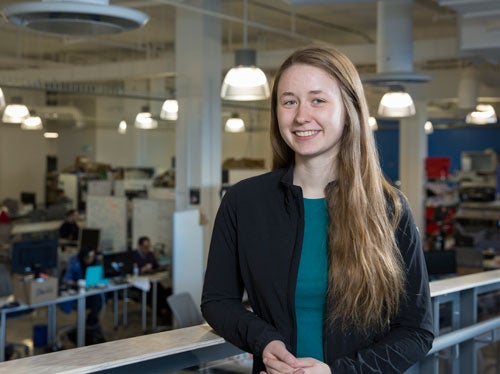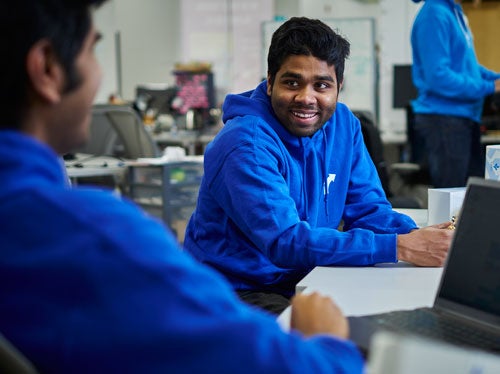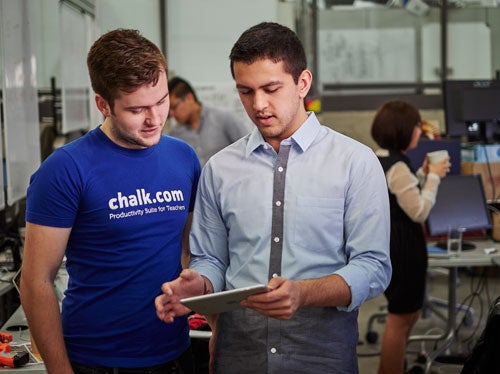
Waterloo’s startup + co-op connection
Entrepreneurial co-op students find job satisfaction in edgy startup culture at the University of Waterloo

Entrepreneurial co-op students find job satisfaction in edgy startup culture at the University of Waterloo
By Christian Aagaard Marketing and Strategic CommunicationsOne thing about working at a startup — the orientation tour is pretty short.
Not that Kaley Bibic has any complaints about that. A University of Waterloo student in systems design engineering, Bibic zeroed in on Waterloo Region’s startup community when she set out to find her first co-op placement.
She wanted “real, hands-on opportunities.

Kaley is a mechanical engineering student. She is a co-op student with Avidbots, a company that just moved out of the Velocity Foundry.
“It has turned out the way I thought it would,” Bibic said. “The very first day, I got a real project to work on. You get thrown into it and you start right away.”
In January, Bibic took her passion for robots — and her interest in design — to Avidbots, a startup that is developing autonomous floor-cleaning machinery for such settings as offices, shopping malls and factories. Avidbots moved from the Velocity Foundry, a hardware-oriented incubator for startups, to industrial space in Waterloo in February.
Bibic runs calculations and builds 3D models on her computer. When she has questions — lots of them, she admits — she leans over to ask her supervisor. There is no corner office, no executive suite.
“It’s pretty amazing, just looking back over the first few months, to see how much I’ve learned,” Bibic says. “It has definitely surprised me."
Waterloo has led co-operative education in Canada for more than 50 years. Thousands of students have completed paid co-op terms with established companies in offices, laboratories and outdoor settings. The most recent statistics show that more than 18,000 Waterloo co-op students earned $193 million in one year working for more than 5,000 employers.
Now technology startups, often parked shoulder to shoulder in open-concept incubators, offer a grittier opportunity, where the entrepreneurs aren’t much older than the co-op students they hire.
“The reason a student would go to a startup is that typically you have an opportunity to get a broader set of experiences and employ a broader set of skills,” said Mike Kirkup, director of Waterloo’s Velocity program. “There tends to be more transparency inside a startup, so co-op students get to see more elements of the business than they typically would inside a larger company."
In mentored incubators such as Velocity’s Garage and Foundry programs, he added, the supervision of co-op students often gives young entrepreneurs their first lessons in managing people.
Waterloo has taken the connection between startups and co-op a step further.
Its Enterprise Co-op (E-Co-op) program, based at the Conrad Business, Entrepreneurship and Technology Centre, offers student entrepreneurs a chance to work on their own businesses as a co-op placement.
The program sets the bar high for the 20 to 30 students who join per term, said lecturer and program co-ordinator Wayne Chang. They have to map out goals covering the 16-week period, build business networks, find money and do presentations on how they’re coming along.
Since business plans rarely stay intact, the students also learn to adapt and pivot, Chang said.
“You have to do stuff over and over again,’’ he said. "It’s an iteration process. It isn’t a deadline-driven thing, where you drop (something off) and somebody marks it and you don’t have to look at it again.”
E-Co-op seems to be working out for Duleek Ranatunga. A student in Waterloo’s nanotechnology engineering program, Ranatunga developed an odd material and ran it through a 3D printer.
But he didn’t have a purpose for the technology until people noticed that the material had the consistency of live tissue.
That led to Ourotech, a company he founded to use the material and 3D printing as a surgical tool. The technology produces models of tumors and organs from conventional imaging technology. Surgeons get a better of idea of what they’re dealing with before they operate.
“I knew nothing about business,’’ said Ranatunga, who recently earned $5,000 for Ourotech at a mid-term, E-Co-op business pitch. “I am an engineer, a scientist. Basically, I had this technology and I thought everybody would buy it because it was new.
“It turned out that’s not how the world works. E-Co-op taught me how to approach making a business, how to be successful. It even gave me soft skills like presentation and networking.”
Engineering students aren’t the only ones snapped up for co-op jobs. Naim Ismail, a second-year arts-and-business student, landed a co-op term with Ubiq.
Ubiq has created wireless technology to cut the cable clutter of business presentations. The company is maturing as a startup, Ismail said. Having found customers, Ubiq now needs to build relationships that keep people coming back.

Ubiq co-founder Sumit Pasupalak (right) is a Waterloo alumnus and his co-op student Naim Ismail (left) is a current Waterloo student. They have developed a wireless presentation device called the "Hive".
“We’re transitioning into a small business, and in that process, I’m learning about how I organize customers, how I organize the sales process,” Ismail said. “I have to make sure that everyone on the team knows what stage the customer is in, or what they need and what the next steps might be.”
Not too long ago, William Zhou, Ryan McKay-Fleming and Suraj Srinivas hunted for co-op jobs. Now they are the ones doing interviews for Chalk.com, the company they formed to provide teachers with online tools for lesson-planning and student evaluation.
Zhou said his own co-op experiences taught him about workplace conditions that build energy and morale. Chalk.com looks for people who show passion that runs deeper than the resumé, McKay-Fleming added.

Chalk.com CTO Ryan McKay-Fleming (left) is a Waterloo alumnus and his co-op student Aleem Dhanji (right) is a current Waterloo student. Chalk.com has developed "Planboard" which helps teachers plan lessons and assess students.
It made Aleem Dhanji, a computer science student, stand out as a co-op prospect. His stay at Chalk.com is his second co-op placement. The startup experience, Dhanji said, makes him feel like he meaningfully contributes to the success of the company.
“The work that you do is always incredibly important,’’ he said. “I think it is pretty phenomenal that, as a co-op student, I have been given the opportunity to basically lead my own project . . .You contribute at the same level, and face the same expectations, as anyone else on the team.”

Read more
Here are the people and events behind some of this year’s most compelling Waterloo stories

Read more
More than 20 founders from Waterloo highlight the newly unveiled list that celebrates those making the biggest impact inside Canadian tech and innovation

Read more
The Kitchener-Waterloo Oktoberfest Rogers Women of the Year awards recognize leaders for outstanding community contributions
The University of Waterloo acknowledges that much of our work takes place on the traditional territory of the Neutral, Anishinaabeg, and Haudenosaunee peoples. Our main campus is situated on the Haldimand Tract, the land granted to the Six Nations that includes six miles on each side of the Grand River. Our active work toward reconciliation takes place across our campuses through research, learning, teaching, and community building, and is co-ordinated within the Office of Indigenous Relations.